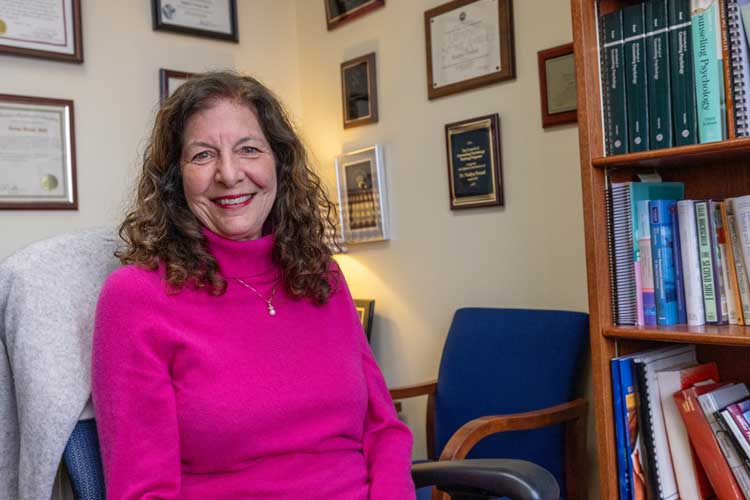Nadya Fouad discovered her own career when she was in the graduate program in counseling psychology at the University of Minnesota more than 40 years ago. The program emphasized how people make career and work decisions, “and I just really kind of fell in love with the whole field.”
Her own studies and teaching have focused on understanding those decisions, especially as they impact women and underrepresented populations.
Fouad, distinguished professor of educational psychology, the Mary and Ted Kellner Endowed Chair of Educational Psychology and director of the counseling psychology program, retired in June after 40 years at UWM.
“It’s been a terrific place to have a career,” she said.
Fouad has published more than 150 peer-reviewed articles, book chapters, and books, and her research has been cited more than 17,500 times.
In addition to teaching, she has served as special assistant to the provost for conflict resolution, and chair of the Ombuds Council. She is also past Editor-in-Chief of the Journal of Vocational Behavior and The Counseling Psychologist. She has published more than 150 peer-reviewed articles, book chapters, and books, and her research has been cited more than 17,500 times.
Among many honors, she was awarded the Leona Tyler Award for Lifetime Achievement in Counseling Psychology by the American Psychological Association’s Society of Counseling Psychology.
She also supervises doctoral students in the practicum sequence, advises students’ dissertation research, and has chaired 52 dissertation committees. “That’s been incredibly rewarding,” she said. Mary Kellner, who with her husband established the department’s endowed chair, is a former student.
Groundbreaking Research
Of the many research projects Fouad has been involved in, one of her favorites is the work she’s done with Romila Singh, associate professor of organizations and management in the Lubar School of Business, on women in engineering.
That work grew out of a conversation with doctoral student, Mary Fitzpatrick (now at UW-Madison) who had left engineering to pursue a doctorate in counseling psychology. Fitzpatrick wondered why, after years of efforts to encourage women to choose STEM (Science Technology Engineering and Mathematics) fields, so few women stayed in engineering.
Singh and Fouad published a groundbreaking study in 2012, funded by the National Science Foundation, that showed although women had earned 20% of engineering degrees over the previous 20 years, they made up only 11% of the workforce.
“The women in engineering study hit a nerve,” Fouad said. “We were hoping for 800 respondents, and we got over 5,500. More than 500 women who responded to the survey link had graduated in engineering, but they never became engineers. That’s huge.” Their research, which has since been cited numerous times in academic journals and national and international media, showed women left the field, not primarily for family reasons, but because of the culture and climate in the field.
Working Across Disciplines
Fouad has worked closely and across disciplines with many students and colleagues, including a number of projects with Phil Smith, a now-retired professor of statistics.
“Both those projects and the work on women in engineering included students and resulted in a number of publications,” Fouad said. “It was just a lot of fun to challenge each other and come from different disciplines and bring unique perspectives to the projects.”
Fouad and her team were part of an ongoing university initiative to develop and assess the impact of undergraduate career exploration classes. Budget cuts were a continuing challenge, but in spite of that, Fouad is proud that she was able to help build a strong doctoral program in counseling psychology.
And she worked with colleagues to build on efforts started by Adrian Chan, retired professor and vice chancellor, to focus on cross-cultural competence and multicultural counseling in the program.
I thought it would be maybe four or five years, but it’s been a great, great place to work. I’ve been fortunate in my colleagues in the department, my students and colleagues across campus.
After retirement, Fouad said she plans to continue researching and enjoying her garden. (She’s certified as a master gardener.) With three sons and five grandchildren, family time is also on the calendar. One of her sons and his family live in Denmark so that’s on her list of destinations. “I’m looking forward to traveling outside the academic year.”
As Fouad looks back over 40 years, she’s like many people — she didn’t think she would stay in one place for most of her career.
“I thought it would be maybe four or five years, but it’s been a great, great place to work. I’ve been fortunate in my colleagues in the department, my students and colleagues across campus.”
